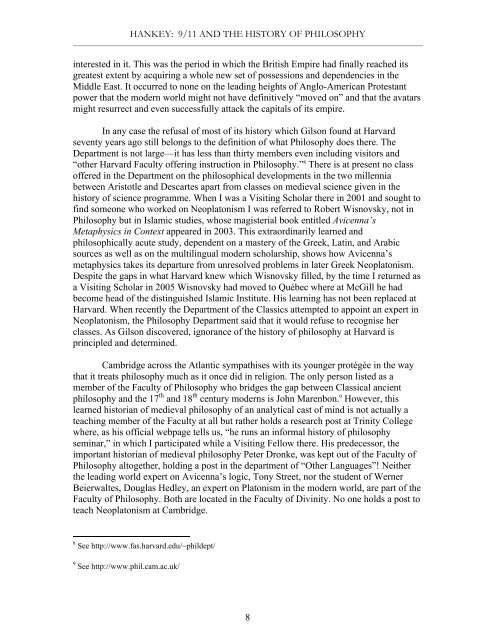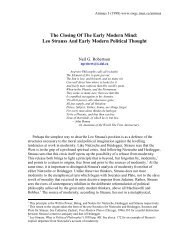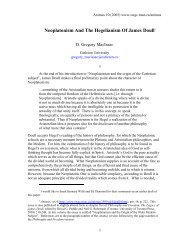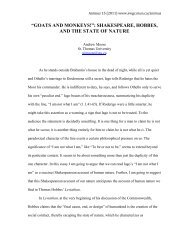Wayne Hankey, 9/11 and the History of Philosophy - Memorial ...
Wayne Hankey, 9/11 and the History of Philosophy - Memorial ...
Wayne Hankey, 9/11 and the History of Philosophy - Memorial ...
You also want an ePaper? Increase the reach of your titles
YUMPU automatically turns print PDFs into web optimized ePapers that Google loves.
HANKEY: 9/<strong>11</strong> AND THE HISTORY OF PHILOSOPHYinterested in it. This was <strong>the</strong> period in which <strong>the</strong> British Empire had finally reached itsgreatest extent by acquiring a whole new set <strong>of</strong> possessions <strong>and</strong> dependencies in <strong>the</strong>Middle East. It occurred to none on <strong>the</strong> leading heights <strong>of</strong> Anglo-American Protestantpower that <strong>the</strong> modern world might not have definitively “moved on” <strong>and</strong> that <strong>the</strong> avatarsmight resurrect <strong>and</strong> even successfully attack <strong>the</strong> capitals <strong>of</strong> its empire.In any case <strong>the</strong> refusal <strong>of</strong> most <strong>of</strong> its history which Gilson found at Harvardseventy years ago still belongs to <strong>the</strong> definition <strong>of</strong> what <strong>Philosophy</strong> does <strong>the</strong>re. TheDepartment is not large—it has less than thirty members even including visitors <strong>and</strong>“o<strong>the</strong>r Harvard Faculty <strong>of</strong>fering instruction in <strong>Philosophy</strong>.” 8 There is at present no class<strong>of</strong>fered in <strong>the</strong> Department on <strong>the</strong> philosophical developments in <strong>the</strong> two millenniabetween Aristotle <strong>and</strong> Descartes apart from classes on medieval science given in <strong>the</strong>history <strong>of</strong> science programme. When I was a Visiting Scholar <strong>the</strong>re in 2001 <strong>and</strong> sought t<strong>of</strong>ind someone who worked on Neoplatonism I was referred to Robert Wisnovsky, not in<strong>Philosophy</strong> but in Islamic studies, whose magisterial book entitled Avicenna’sMetaphysics in Context appeared in 2003. This extraordinarily learned <strong>and</strong>philosophically acute study, dependent on a mastery <strong>of</strong> <strong>the</strong> Greek, Latin, <strong>and</strong> Arabicsources as well as on <strong>the</strong> multilingual modern scholarship, shows how Avicenna’smetaphysics takes its departure from unresolved problems in later Greek Neoplatonism.Despite <strong>the</strong> gaps in what Harvard knew which Wisnovsky filled, by <strong>the</strong> time I returned asa Visiting Scholar in 2005 Wisnovsky had moved to Québec where at McGill he hadbecome head <strong>of</strong> <strong>the</strong> distinguished Islamic Institute. His learning has not been replaced atHarvard. When recently <strong>the</strong> Department <strong>of</strong> <strong>the</strong> Classics attempted to appoint an expert inNeoplatonism, <strong>the</strong> <strong>Philosophy</strong> Department said that it would refuse to recognise herclasses. As Gilson discovered, ignorance <strong>of</strong> <strong>the</strong> history <strong>of</strong> philosophy at Harvard isprincipled <strong>and</strong> determined.Cambridge across <strong>the</strong> Atlantic sympathises with its younger protégée in <strong>the</strong> waythat it treats philosophy much as it once did in religion. The only person listed as amember <strong>of</strong> <strong>the</strong> Faculty <strong>of</strong> <strong>Philosophy</strong> who bridges <strong>the</strong> gap between Classical ancientphilosophy <strong>and</strong> <strong>the</strong> 17 th <strong>and</strong> 18 th century moderns is John Marenbon. 9 However, thislearned historian <strong>of</strong> medieval philosophy <strong>of</strong> an analytical cast <strong>of</strong> mind is not actually ateaching member <strong>of</strong> <strong>the</strong> Faculty at all but ra<strong>the</strong>r holds a research post at Trinity Collegewhere, as his <strong>of</strong>ficial webpage tells us, “he runs an informal history <strong>of</strong> philosophyseminar,” in which I participated while a Visiting Fellow <strong>the</strong>re. His predecessor, <strong>the</strong>important historian <strong>of</strong> medieval philosophy Peter Dronke, was kept out <strong>of</strong> <strong>the</strong> Faculty <strong>of</strong><strong>Philosophy</strong> altoge<strong>the</strong>r, holding a post in <strong>the</strong> department <strong>of</strong> “O<strong>the</strong>r Languages”! Nei<strong>the</strong>r<strong>the</strong> leading world expert on Avicenna’s logic, Tony Street, nor <strong>the</strong> student <strong>of</strong> WernerBeierwaltes, Douglas Hedley, an expert on Platonism in <strong>the</strong> modern world, are part <strong>of</strong> <strong>the</strong>Faculty <strong>of</strong> <strong>Philosophy</strong>. Both are located in <strong>the</strong> Faculty <strong>of</strong> Divinity. No one holds a post toteach Neoplatonism at Cambridge.8 See http://www.fas.harvard.edu/~phildept/9 See http://www.phil.cam.ac.uk/8
















